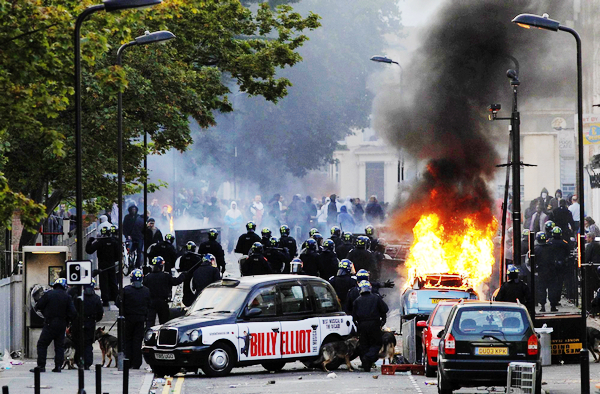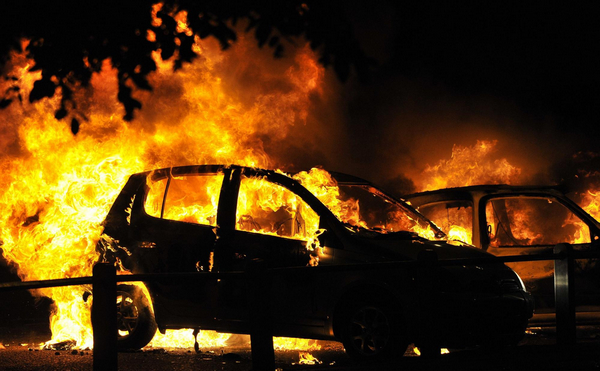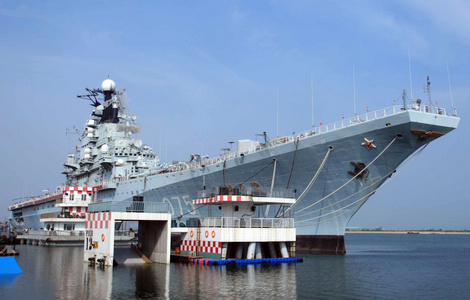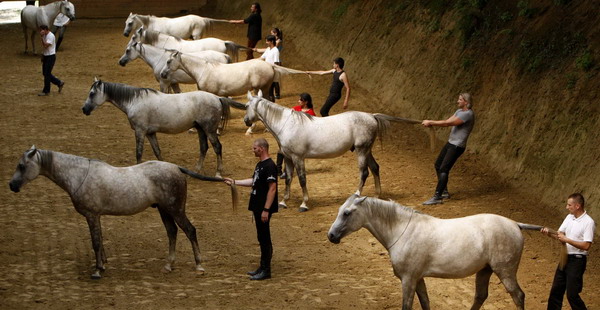Riots spread through UK cities
Updated: 2011-08-09 14:00
(Agencies)
|
|||||||||||
 |
| Police officers in riot gear block a road near a burning car on a street in Hackney, east London August 8, 2011. Youths hurled missiles at police in northeast London on Monday as violence broke out in the British capital for a third night.[Photo/Agencies] |
LONDON?-- A wave of violence and looting raged across London and spread to three other major British cities on Tuesday, as authorities struggled to contain the country's worst unrest since race riots set the capital ablaze in the 1980s.
In London, groups of young people rampaged for a third straight night, setting buildings, vehicles and garbage dumps alight, looting stores and pelting police officers with bottles and fireworks. The spreading disorder was an unwelcome view of London's volatility for leaders organizing the 2012 Summer Olympics in less than a year.
Police called in hundreds of reinforcements?- and made a rare decision to deploy armored vehicles in some of the worst-hit districts?- but still struggled to keep pace with the chaos unfolding at flashpoints across London, in the central city of Birmingham, the western city of Bristol and the northwestern city of Liverpool.
The riots appeared to have little unifying cause?- though some involved in the violence claimed to oppose sharp government spending cuts, which will slash welfare payments and cut tens of thousands of public sector jobs through 2015.
Others appeared attracted simply by the opportunity for violence. "Come join the fun," shouted one youth, racing along a street in the east London suburb of Hackney, where shops were attacked and cars torched.
Prime Minister David Cameron reversed an earlier decision and cut short his summer vacation in Italy, heading home for a meeting of the national crisis committee on Tuesday morning.
The crisis will be a major test of Cameron's coalition government, which includes members who had long suspected its program of tough budget restraints could provoke popular dissent.
Cameron was expected to seek to toughen the response in meetings with ministers and police chiefs on Tuesday. Some communities complain that stretched police were simply unable to reach some of the fast-spreading unrest.
Rioters were left virtually unchallenged in several neighborhoods and able to plunder from stores at will or attempt to invade homes. Restaurants and stores closed early across London, fearful of looting.
Disorder flared throughout the night, from gritty suburbs along the capital's fringes to central London's famously posh Notting Hill neighborhood. London's Ambulance Service said it had treated 16 patients, of whom 15 were hospitalized. Police said 334 people had been arrested and 69 people charged with offenses.
Three people were arrested on suspicion of the attempted murder of a police officer left hospitalized after he was struck by a car in the early hours of Tuesday. The officer, who is in a stable condition, had stopped a number of cars in Brent, north London, following looting at a nearby electrical store.
Police said one car drove away, striking the officer and a colleague, who suffered minor injuries. The vehicle was later stopped again and three people arrested on suspicion of attempted murder.
Violence first broke out late Saturday in the low-income, multiethnic district of Tottenham in north London, where outraged protesters demonstrated against the fatal police shooting of Mark Duggan, a 29-year-old father of four who was gunned down in disputed circumstances Thursday.
A brief inquest hearing into Duggan's death will take Tuesday, though it will likely be several months before a full hearing is convened.
Duggan's death stirred old animosities and racial tensions similar to those that prompted massive riots in the 1980s, despite efforts by London police to build better relations with the city's ethnic communities after high-profile cases of racism in recent decades.
 |
| Cars burn on a street in Ealing, London August 9, 2011. Looting by groups of hooded youths spread to Ealing in west London and Camden in the north of the British capital late on Monday, the third night of violence which police have blamed on criminal thugs.[Photo/Agencies] |
But, as the unrest spread, some pointed to rising social tensions in Britain as the government slashes 80 billion pounds ($130 billion) from public spending by 2015 to reduce the huge deficit, swollen after the country spent billions bailing out its foundering banks.
In the south London district of Croydon, police said a 26-year-old man was shot and seriously injured Monday but were unable to say immediately whether the incident was linked to rioting there.
A massive blaze ravaged a 100-year-old family run furniture store in Croydon and sent thick plumes of smoke into the air, forcing nearby homes to be evacuated. In the Clapham Junction area of south London, a mob stole masks from a fancy dress store to disguise their identities and then set the building on fire.
Sony Corp. said a major blaze had broken out at its distribution center near Enfield, north London, damaging stocks of DVDs and other products. So many fires were being fought in the capital that Thames Water, which supplies most of London, warned that some of its customers could see their water pressure drop.
Dozens of people attacked shops in Birmingham's main retail district, and clashed with police in Liverpool and Bristol?- spreading the chaos beyond London for the first time.
In Hackney, hundreds of youths left a trail of burning trash and shattered glass. Looters ransacked a small convenience store, filling plastic shopping bags with alcohol, cigarettes, candy and toilet paper.
"This is the uprising of the working class. We're redistributing the wealth," said Bryn Phillips, a 28-year-old self-described anarchist, as young people emerged from the store with chocolate bars and ice cream cones.
Phillips claimed rioters were motivated by distrust of the police, and drew a link between the rage on London's street and insurgent right-wing politics in the United States. "In America you have the tea party, in England you've got this," he said.
Police acknowledged Tuesday that major new bouts of violence had flared in at least five locations, badly stretching their resources.
"The violence we have seen is simply inexcusable. Ordinary people have had their lives turned upside down by this mindless thuggery," police commander Christine Jones said.
Though the unrest escalated through Sunday as disorder spread among neighboring areas, the crisis worsened Monday?- with violence touching areas in the east and south of London previously untroubled by the chaos.
Some residents called for police to deploy water cannons to disperse rioters, or call on the military for support and questioned the strength of leadership within London's police department _ particularly after a wave of resignations prompted by the country's phone-hacking scandal.
"I have never seen such a disregard for human life. I hope they rot in hell. The grief they have caused people, the fear they have put in people's hearts, decent people who have done nothing to anyone," said Alan McCabe, a resident in Croydon watching the violence unfold.
About 100 young people clashed early Tuesday with police in the Camden and Chalk Farm areas of north London, smashing their way into a bicycle store and mobile phone shop.
The small groups of youths?- most with their heads and faces covered?- used SMS messages, instant messaging on BlackBerry smartphones and social media platforms such as Twitter to coordinate their attacks and stay ahead of the police.
Once the preserve of businesspeople, BlackBerry handsets are popular with teenagers, thanks to their free, fast instant messaging system. Blackberry's manufacturer, Research in Motion, said in a statement that it was assisting authorities in their investigation and "feel for those impacted by the riots in London."
Police were also monitoring Twitter, and warned that those who posted messages inciting the violence could face arrest.
In the Peckham district of south London, where a building was set ablaze along with a bus?- which was not carrying passengers?- onlookers said the scene resembled a conflict zone. Cars were torched in nearby Lewisham, and in west London's Ealing suburb the windows of each store along entire streets had been smashed.
"There's been tension for a long time. The kids aren't happy. They hate the police," said Matthew Yeoland, a 43-year-old teacher watching the unrest in Peckham. "It's like a war zone and the police weren't doing anything. There were too many people and not enough police."
Police said Duggan was shot dead last week when police from Operation Trident?- the unit that investigates gun crime in the black community?- stopped a cab he was riding in.
The Independent Police Complaints Commission, which is investigating the shooting, said a "non-police firearm" was recovered at the scene, and media reports said a bullet had been found in an officer's radio. However, the Guardian newspaper reported that the bullet in the radio was police-issue, indicating Duggan may not have fired at the officer.
Duggan's partner, Semone Wilson, insisted Monday that her fiance was not connected to gang violence and urged police to offer more information about his death. But she rejected suggestions that the escalating riots were linked to protests over his death. "It got out of hand. It's not connected to this anymore. This is out of control," she said.
"It's nothing to do with the man who was shot, is it?" said 37-year-old Marcia Simmons, who has lived in Tottenham, an ethnically diverse north London neighborhood, all her life. "A lot of youths ... heard there was a protest and joined in. Others used it as an opportunity to kit themselves out, didn't they, with shoes and T-shirts and everything."
The past year has seen mass protests against the tripling of student tuition fees and cuts to public sector pensions. In November, December and March, small groups broke away from large marches in London to loot. In the most notorious episode, rioters attacked a Rolls-Royce carrying Prince Charles and his wife Camilla to a charity concert.
However, the full impact of spending cuts has yet to be felt and the unemployment rate is stable?- although it remains highest among youth, especially in areas like Tottenham, Hackney and Croydon.
Some people caught up in the unrest insisted that joblessness was not to blame. "It's just an excuse for the young ones to come and rob shops," said Brixton resident Marilyn Moseley, 49.
Police urged communities to help clear the streets of people, and called on families to contact their children and ensure that they were not involved in the chaos. An 11-year-old boy was charged with burglary by police, and at least 100 of those arrested were aged 21 or younger. About 35 police officers had been injured in the violence, police said.
Home Secretary Theresa May, the Cabinet minister responsible for policing, and London Mayor Boris Johnson also cut short summer vacations in an attempt to deal with the crisis.
Police in the city of Birmingham, 120 miles (195 kilometers) north of London, confirmed that officers had arrested 35 people amid disorder across the city center, where shops were being vandalized. In Bristol, police urged residents to avoid the city center after 150 rioters went on the rampage.
In the south London neighborhood of Brixton?- the scene of riots in the 1980s and 1990s?- youths smashed windows, attacked a police car, set fire to garbage bins and stole video games, sportswear and other goods from stores on Sunday night.
Tottenham and Brixton are impoverished areas with ethnically diverse populations, large black communities and histories of unrest.
Tottenham was the site of the 1985 Broadwater Farm riots, a series of clashes that led to the fatal stabbing of a police officer and the wounding of nearly 60 others?- and underscored tensions between London police and the capital's black community.
On Saturday, two police cars and a double-decker bus were set alight, stores were looted and several buildings along Tottenham's main street?- five miles (eight kilometers) from the site of the 2012 Olympics?- were reduced to smoldering shells.
West Ham, a football team in east London, confirmed it had canceled a match planned for Tuesday as a precaution. However, the national Football Association insisted that a scheduled international friendly match between England and the Netherlands would go ahead at Wembley Stadium on Wednesday.
The International Olympic Committee insisted it had confidence in British authorities. "Security at the Olympic Games is a top priority for the IOC," spokesman Mark Adams said.
Hot Topics
The European Central Bank (ECB) held a conference call late on Sunday ahead of the market opening, pledging the ECB will step in to buy eurozone bonds with efforts to forestall the euro zone's debt crisis from spreading.
Editor's Picks

|

|

|

|

|

|







